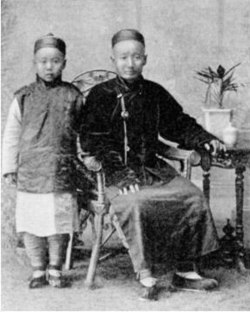
Back Iddewon Kaifeng Welsh Judíos de Kaifeng Spanish یهودیان کایفنگ Persian Kaifengin juutalaiset Finnish יהדות קאיפנג HE Yahudi Kaifeng ID 開封のユダヤ人 Japanese 카이펑 유대인 Korean Kaifengjødene NB کائفینگ یہود PNB
 Jews of Kaifeng, late 19th or early 20th century | |
| Regions with significant populations | |
|---|---|
| 600–1,000[1] | |
| 20 (as of 2016)[2] | |
| Languages | |
| Mandarin Chinese | |
| Religion | |
| Judaism | |
| Related ethnic groups | |
| Bukharan Jews, Persian Jews, Han Chinese, Hui people | |
Kaifeng Jews (Chinese: 開封猶太人; pinyin: Kāifēng Yóutàirén; Hebrew: יהדות קאיפנג, romanized: Yahădūt Qāʾyfeng) are a small community of descendants of Chinese Jews in Kaifeng, in the Henan province of China. In the early centuries of their settlement, they may have numbered around 2,500 people.[3] Despite their isolation from the rest of the Jewish diaspora, their ancestors managed to practice Jewish traditions and customs for several centuries.
The distinctive customary life of the Kaifeng community slowly eroded, as assimilation and intermarriage with Han Chinese and Hui neighbors advanced, until, by the 19th century, its Jewishness largely became extinct, apart from its retention of memories of its clan's Jewish past.[a]
The place of origin of these Jews and the date when they established their settlement in Kaifeng are sources of intense debate among experts. While the descendants of the Kaifeng Jews are assimilated into mainstream Chinese culture, some of them are trying to revive the beliefs and customs of their ancestors. In the 21st century, efforts have been made to revive Kaifeng's Jewish heritage and encourage the descendants of its original population to convert back to Judaism.[4] Via the offices of the Shavei Israel organization, a number of young Chinese descendants of Kaifeng Jews have made aliyah.[5][6][7][8] Since 2015, descendants of the Kaifeng Jews have come under government pressure and suspicion.[9]
- ^ Pfeffer 2008.
- ^ Winer 2016.
- ^ Pollak 1998, pp. 317–319.
- ^ Laytner 2017, pp. 227–228.
- ^ Freund 2015.
- ^ JP 2009.
- ^ Burke & Jabari 2016.
- ^ Bitton 2010.
- ^ Buckley 2016b.
Cite error: There are <ref group=lower-alpha> tags or {{efn}} templates on this page, but the references will not show without a {{reflist|group=lower-alpha}} template or {{notelist}} template (see the help page).